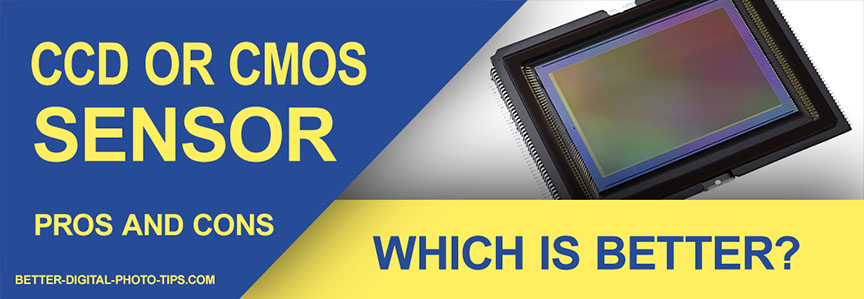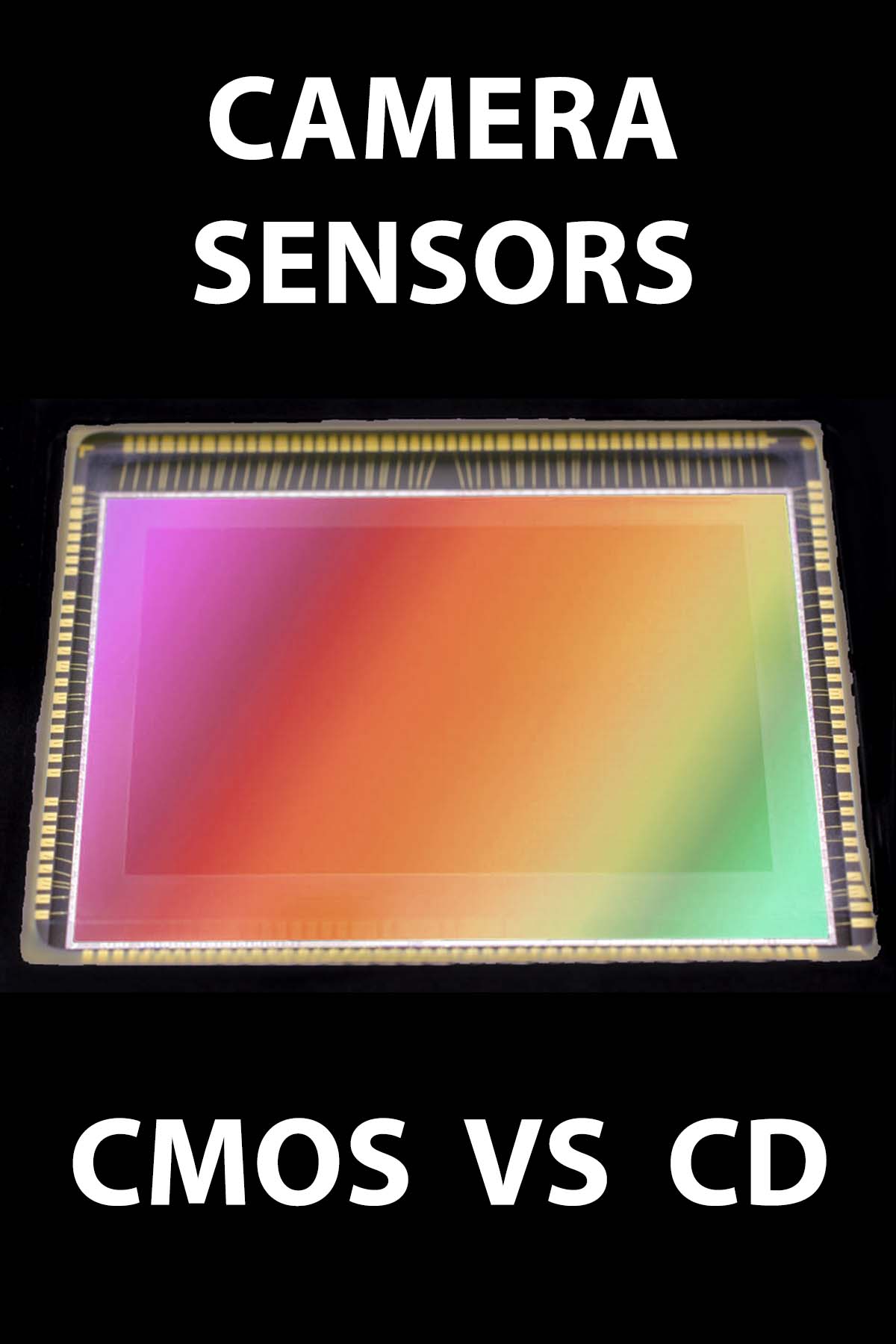HOW TO POSTS: LIGHTING AND COMPOSITION
ccd vs cmos
Which Is Better For digital camera Sensors
CCD vs CMOS. That is the question. Whether 'tis nobler to choose quality and cost or to choose features and energy efficiency. Should it be CCD (charge coupled device) or CMOS (complementary metal oxide semiconductor) when making your digital camera choice?
WRITTEN BY: BRUCE LOVELACE
UPDATE: November 7, 2024
Now that their technology has advanced so much, for most digital cameras today the CMOS sensors are better. Because of their lower power consumption, faster processing speeds, lower cost, and improved image quality, they're great for a wider range of photography.
CCD sensors still excel in specific situations where highest image quality and low noise are critical, especially in low-light conditions.
This was a question that I struggled with when I was first considering which kind of digital camera to buy.
These two types of image sensors came into being in the late 1960s and into the 1970s. CCD sensors were clearly the best choice early on because of their superior quality and so my first digital SLR camera was an Olympus E-10 with a 4.0 megapixel CCD sensor.
Because of continuous technological developments, there are many other sophisticated and technical differences in how the sensors are manufactured as well as how the digital information is processed and stored. My last six DSLR cameras, the Canon 10D, 20D and 5D, 5D Mark III, 70D, and 90D all have had Complementary Metal Oxide Semiconductor (CMOS) sensors.

ccd advantages
CCD sensors convert the pixel measurements using circuitry surrounding the sensor and do it sequentially. All the pixels are amplified by a single amplifier.
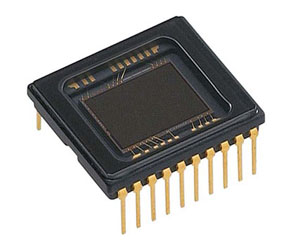 CCD Sensor
CCD SensorSo, what are the advantages of having your sensor be a CCD type?
- Higher Quality Images
- Less Digital Noise in low lighting conditions
- Higher Resolution and better light sensitivity
- More color depth because CCD sensors have more dynamic range
This kind of sensor would be good for professional photographers and imaging scientists where the absolute highest quality is needed.
cmos advantages
CMOS sensors use the circuitry on the sensor itself and they convert the signals from the pixels all at once in a simultaneous manner. These sensors use separate amplifiers on each pixel.
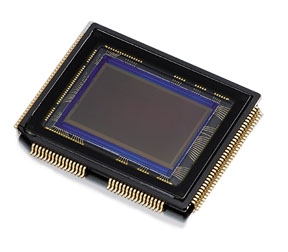 CMOS Sensor
CMOS SensorWhat are the advantages of having a CMOS type of sensor in your camera?
- Less Power Consumption-a whole lot more. Batteries may last longer.
- Cheaper cost because they're less expensive to make.
- Faster processing. The ADC and the pixels are built onto the same chip.
- CMOS quality is vastly improved so the difference from CCD is minimal.
This kind of sensor would make sense for camera phones, PDAs and other portable devices where power is at a premium and quality is not essential.
Let's take a look at specific questions related to the CMOS vs CCD comparison.
ccd vs cmos for astrophotography
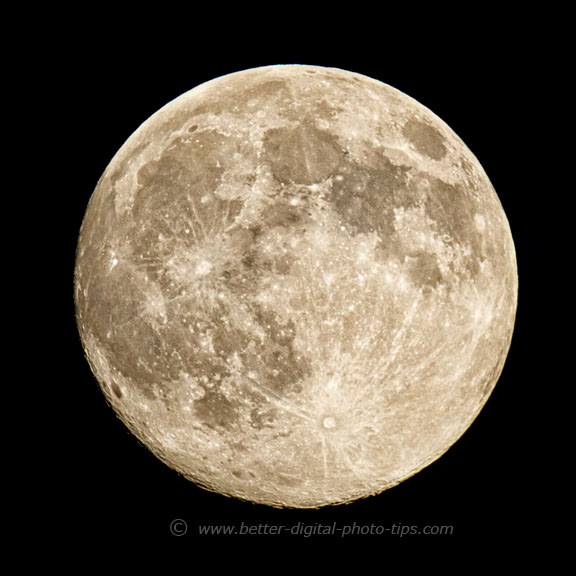 Moon Photo
Moon PhotoTaken With CMOS Sensor
According to skyandtelescop.org if you're shooting scientific imagining then the CCD sensor is the way to go.
With astrophotography and a CCD sensor you can meticulously calibrate your photos and make measurements better than you can with a CMOS sensor.
If you're like me and you want to shoot the moon, the Milky Way, or the entire starry sky and get a nice image. You can use either a CCD or CMOS equipped camera.
Both CCD and CMOS sensors come in cheap low quality and they both are available in high quality. Generally if the price is high then the quality is too.
ccd vs cmos for video
What about the best sensor type for shooting video? CCD sensor are not as fast as CMOS. That means CMOS sensors are better adapted for faster video frame rates. That brings up the secondary question if CCD sensors are fast enough for shooting high frame rate video anyway.
My mid-range Canon 90D, with its CMOS sensor, can shoot video at 120 fps. Enough said.
Does ccd or cmos sensor have better dynamic range
There is a range in the minimum and maximum signal that can be detected by a sensor. It's called dynamic range. Think of it has the darkest and lightest light levels that can be detected for any given sensor.
It's more important to note that larger sensors (with larger pixels) will have better dynamic range than smaller sensors. That's why professional photographers use full frame over smaller crop frame cameras.
I didn't find strong evidence in one way or another for which sensor sensor, the CCD or CMOS, has an edge over the other in terms of dynamic range. Other factors come into play that blur the divide. According to opticsforhire.org, CMOS sensors tend to (but not always) have a higher dynamic range.
ccd sensor noise vs cmos sensor noise
Digital noise is one of the biggest concerns of photographers who shoot in low levels of light. Because CCD sensors have more sensitivity to light, the signal does not have to be amplified as much. Generally speaking, CCD camera sensors produce less noise than CMOS camera sensors.
Here again though, the size of the sensor and the size of the individual pixels matter quite a bit in the amount of noise you get when you take a photograph. Additionally, the more modern technology with the improvements in engineering with CMOS sensors, the gap has narrowed considerably.
Camera image processors as well as remarkable artificial intelligence used in recently developed photo editing software has made image noise much less of an issue when using CMOS or CCD camera sensors.
ccd vs cmos color
How do the sensor types compare in terms of color. I made no new discoveries on this question. There may be slight differences in image color accuracy, but it's not worth worrying about for you and me.
You now have so much control in editing color balance with color temperature, tint, hue, saturation, vibrancy, both locally and globally on any image.
Whether you adjust your camera settings, edit your photos afterwards, or both, you have significant control over the color of your finished photograph at your disposal.
ccd vs cmos conclusion
I can honestly tell you, that in the more than 2 decades of digital photography experience, I have never been able to tell the difference between a photo taken with a CCD chip versus a CMOS chip.
The most important thing in the quality of your digital photos is you. There are many other digital photo tips about choosing cameras and other related photography tips on this website.
The gap between the two kind of sensors has narrowed dramatically. Remember it's not choosing one over the other that matters the most. The slight differences in these two digital camera sensors won't magically improve your image quality.
Only the highest level of technical or scientific photographers may be able to discern or measure the differences. So what should you do when making your digital camera choice on what to get: CCD vs. CMOS? Decide if those minuscule differences are really important to you.
If not, look at the digital camera reviews and think about what features really matter to you based on the type of digital photography you are doing. Fundamentally, for most photographers, the CCD vs. CMOS choice doesn't really matter much anymore.
It really is a great time to be interested in photography because the tools we have at our disposal are so good. I hope this article was helpful. Search for any topic using the search box below or see the related articles in the links below my signature.
Search for a new topic on this site:
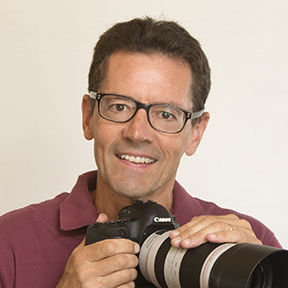
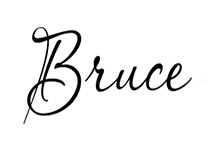
ABOUT BRUCE LOVELACE
Bruce is the publisher of this website. He is the author of the book "Improve Your Photography Instantly." Read more on Bruce on his Bio Page. He's been known as The Traveling Photographer ever since 1994. Read more about this website.
View some of Bruce's photos on Instagram. Visit the Facebook Page. Watch him on YouTube. Bruce runs photo workshops for kids and adults, and provides one-on-one photography coaching.
Digital Photography Education Location on Google My Business
